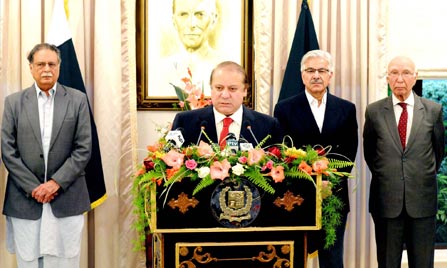
NEW DELHI: A high-level Pakistani government delegation has left for Riyadh, presumably to reassure the Saudi leadership of Pakistan’s support on the crisis in Yemen. The delegation includes the Chief Minister Punjab of Shahbaz Sharif, Adviser on Foreign Affairs Sartaj Aziz and Foreign Secretary Aizaz Chaudhry. Reports indicate that the Pakistani side will meet with Saudi foreign and defence ministers and Saudi Crown Prince Muqrin bin Abdul Aziz.
The delegation’s visit follows a resolution adopted by Pakistan’s parliament that calls for the country’s “neutrality” on the conflict in Yemen. The resolution, in turn, evoked a sharp reaction from Saudi allies, with the UAE Minister of State for Foreign Affairs warning Pakistan that it would pay a “high price” for its “ambiguous stand”. Although there was no other public consternation, analysts agree that behind-the-scene pressure from other Arab capitals prompted Pakistani Prime Minister Nawaz Sharif to issue a clarification of sorts.
On Monday, Sharif appeared in front of cameras in the company of his ministers and advisors and reiterated Pakistani support for Saudi Arabia. “Pakistan does not abandon friends and strategic partners, especially at a time when their security is under threat,” Sharif said. “We are also in touch with other GCC countries to assure them that their disappointment was based on an apparent misinterpretation of parliament’s resolution,” the Prime Minister added, referring to the resolution that had been tabled in Parliament following an official request by the Saudis for Pakistan to join the military offensive in Yemen.
Sharif, however, stuck by his earlier commitment that the Parliament resolution on Yemen will determine the country’s official position, with neutrality effectively ruling out Pakistan lending military support to the Saudi-led coalition that is currently conducting airstrikes on Houthi rebels in Yemen.
In what may be seen as an attempt to offer an olive branch to the Saudis, Sharif condemned the overthrow of Yemeni President Abd-Rabbu Mansour Hadi’s government and referred to the Houthis as rebels -- the language here being at variance with the resolution that stressed on neutrality.
Sharif also reiterated that if Saudi Arabia’s territorial integrity is threatened, or there is any threat to the two Holy Mosques in the country, Pakistan will review its position. This position is in conformity with that of Parliament.
Sharif’s statement and the Parliament resolution comes on the heels of diplomatic activity with Sharif travelling to Turkey to discuss the crisis and Iranian Foreign Minister Jawad Zarif concluding a two-day visit to Islamabad.
In Monday’s statement, Sharif referred to Zarif’s visit -- perhaps to address growing concern regarding closer ties between Tehran and Islamabad. Sharif said that Zarif had been apprised of Pakistan’s position, and that concerns relating to the implications of overthrowing Hadi had been shared. “My government continues to follow the policy of fortifying and strengthening the bonds of friendship with the Gulf countries… There should be no doubt about our policy of solidarity with the GCC States,” Sharif stated.
Monday’s address is a clear indication of the fact that Sharif has found himself stuck between a rock and a hard place, with the statement achieving little in favour of placating the country’s Arab allies. “The GCC countries aren’t happy with the resolution which wants Pakistan to play peace-maker instead of joining their (GCC) ongoing military effort inside Yemen,” Aftab Sherpao, head of the Qaumi Watan Party, told Pakistan’s Dawn News.
Although Pakistan has backed Saudi Arabia’s mission -- which began bombing Yemen on March 26 -- it has not committed itself to any military assistance, with the grapevine in Islamabad anticipating that Sharif would renege on Parliament’s resolution and offer military support to Saudi Arabia.
“The statement did not really add any clarity to the capital’s grape vine. Many people had predicted in the hours before the speech that the prime minister would take U-turn and announce sending troops to Saudi Arabia to appease the Gulf countries. But when this did not happen, it was hard to explain what the speech had achieved,” says a report in Dawn News, capturing the essence of the precarious situation.
Pakistan cannot offer to ignore Saudi Arabia’s request, given its close relations with the Saudi monarchy. This support was already a given. In addition to being allied in terms of Sunni sectarian identity, Pakistan continues to receive much-needed financial assistance from Riyadh. Last year, for instance, Pakistan reportedly received $1.5 billion in aid from Saudi Arabia to meet debt obligations and bolster its foreign exchange reserves. History, too, is indication of Pakistan’s commitment to Saudi Arabia. In 1990, Pakistan agreed to join an international coalition in defence of Saudi Arabia against Iraqi aggression.
At the same time, however, Pakistan has to be careful of its own relations with Iran -- with whom it shares a border and who reportedly support the Houthi rebels -- and it has to be mindful of not overextending the Pakistani army, that is already embroiled in a military offensive within the country’s own borders.
For now at least, reason seems to have prevailed with Pakistan realizing that the cost of its intervention in Yemen is perhaps too high as it will not only fuel sectarian tensions within the country’s own borders but also compromise the military offensive against Pakistan-based and focused militants.

